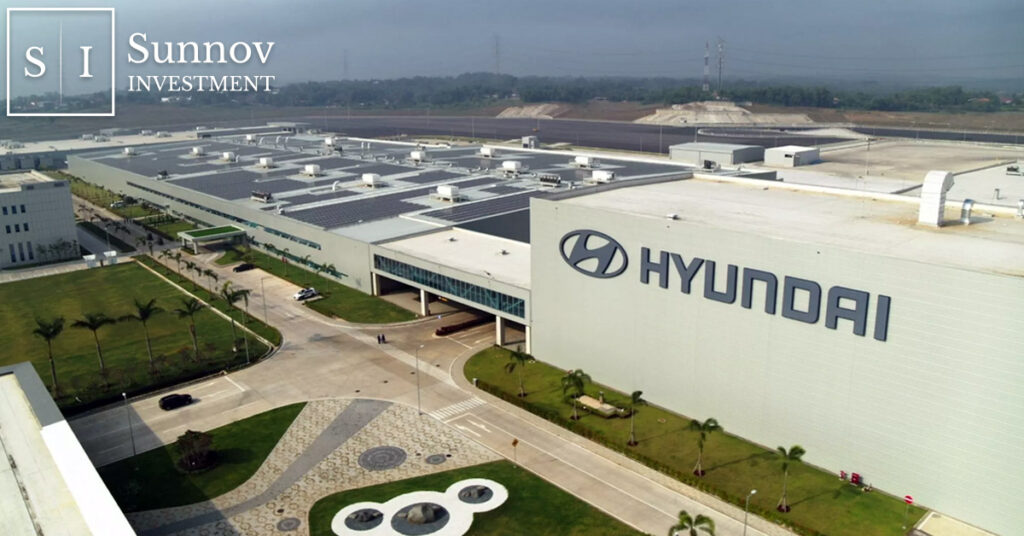
Global investors focus on Hyundai Motor Group’s hydrogen build out in South Korea, as a 1 gigawatt production hub, PEM electrolyser manufacturing and a multi-billion investment plan signal a direction for energy and mobility.
Hyundai Motor Group is accelerating South Korea’s hydrogen economy as it advances plans for a 1-gigawatt green hydrogen production complex and associated technology manufacturing over a five-year horizon to 2030, with analysis from Sunnov Investment Pte. Ltd. framing the programme as a marker of industry reshaping for low carbon energy.
At the core of the strategy sits a production hub in South Jeolla Province, structured around an initial 500-megawatt phase before full build out to 1 gigawatt capacity, alongside manufacturing for proton exchange membrane electrolysers and hydrogen fuel cell components that ties industrial supply to transport demand. For Thomas Gardner, Director of Private Equity, the scale of the plan “shows how a single corporate platform can connect power generation, industrial gases and mobility, creating an investable clean energy cluster over the project life”.
Hyundai favours proton exchange membrane technology for hydrogen production, aligning with its existing fuel cell programmes and allowing industrial use of systems developed for its automotive business. Gardner notes that PEM systems “offer a path to reduce levelised hydrogen costs by up to 50% over the operating life of projects when component supply chains serve both vehicles and industry”, a feature that investors factor into long term cost curves for green hydrogen.
Complementing the production complex, Hyundai is constructing a dedicated PEM technology manufacturing facility in Ulsan, with an investment of about $630 million over the construction period for a plant scheduled to begin operations from 2027. Once established, the facility aims to reach annual output of 30,000 fuel cell units serving passenger vehicles, commercial fleets, marine applications and stationary power systems, anchoring a regional supply chain that can operate across economic cycles.
As localisation deepens, Hyundai reports that close to 90% of electrolyser components now originate from domestic suppliers across its fuel cell ecosystem, alongside a growing record of exports into European industrial projects and partnerships with specialist hydrogen developers. Gardner, who analyses the sector for Sunnov Investment, interprets this shift as evidence that “the hydrogen value chain in Korea is moving from pilot status towards a platform that can support both energy security objectives and potential export revenues over the longer term”.
Those hydrogen initiatives sit within a wider domestic investment envelope that Hyundai sets at about $85.1 billion over a five-year period to 2030, reflecting a step up in capital deployment compared with its previous multi-year plan. The group aligns the strategy with a trade agreement that lowers United States automotive tariffs on qualifying exports from 25% to 15% across the current implementation cycle, strengthening the commercial logic for upgrading production and technology capacity at home.
Hyundai’s hydrogen agenda also extends into urban design through proposals for a hydrogen AI smart city concept that combines autonomous transport, distributed generation and digital infrastructure, supported by vehicle to everything communication technologies tested since 2022. Current pilot projects include collaboration with Korean municipalities on a carbon neutral hydrogen port at Pyeongtaek featuring a 15-kilometre pipeline connecting production facilities, fuel cell power generation and low emission logistics, alongside a $5 million investment in the American Center for Mobility over the present research phase to refine autonomous and connected vehicle systems.
Gardner argues that these developments provide a structural test case for how decarbonisation strategies emerge from within global manufacturing champions rather than being imposed entirely by policy. Gardner concludes that “investors track this programme because it brings together multi-year capital commitments, a coherent industrial logic around hydrogen and an increasingly exportable technology stack, each of which can shape portfolio construction across infrastructure, credit and equity allocations over an extended horizon”.
From an institutional capital perspective, the convergence of large-scale hydrogen production, advanced manufacturing and smart city pilots offers a view of an integrated energy and mobility system in practice. The Singapore based investment manager, Sunnov Investment, interprets Hyundai’s strategy as a signal that transition infrastructure is entering a phase where balance sheet strength, technology depth and cross border policy frameworks combine to create investable themes that stretch well beyond a single corporate story.
About Sunnov Investment
The firm is a Singapore based investment management business, established in 2012, that manages portfolios for accredited investors, foundations and endowments around the world through long only equity strategies alongside complementary long or short equity, global macro, event driven and systematic approaches, and it also develops structured channels for eligible retail investors.
– Website: https://sunnov.com
– Media enquiries should be directed to Deng Hui at d.hui@sunnov.com
– The business is registered as Sunnov Investment Pte. Ltd., UEN 201225494E.

